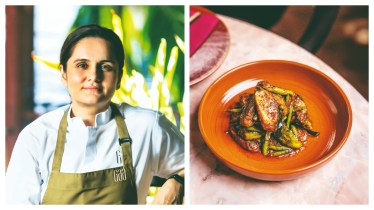Indian cuisine in Thailand and Thai food in India. What do you more identify with?
I’m Indian and I will always be Indian. That part of me is unalienable. But having lived in Thailand, in Bangkok, for so many years, I’ve learned to appreciate the Indian-ness in Thai culture. The similarities in language, in gods, in mythology, in the way of eating, culture. So I think that I really identify with that. And that Thai-ness, I love talking about. Exploring the Indian in Thailand is what I love doing.
As far as India is concerned, you can take the girl out of India, but you can never take the India out of the girl. So that is why, for me, that will be my primary identity.
Where in India do you find inspiration for Gaa recipes and in Thailand for Banng? And since you say you develop your recipes from scratch, how would you describe your food?
I think the approach to Gaa and Banng are very different. Gaa is probably more philosophical or more R&D-based, where we are actually making recipes which don’t exist. However, at Banng, we’re exploring recipes that already exist in the country and bring them to India in a context that Indians would enjoy. Recipes at Gaa don’t exist in a book or don’t exist anywhere. We take existing recipes, ingredients, food combinations, cultural connotations, and then work to make a new experience around that. A new experience that is Indian at heart, but new for the diner. But the recipes at Banng already exists in Thailand, and we feel that these are recipes that people would enjoy back home.
Do you see yourself as an ambassador of Indian cuisine?
Of course. If I call myself an Indian restaurant outside of the country, there is a sense of responsibility that comes with it. We want to do justice to our history, our culture, our cuisine. I do feel that it’s our duty to make sure we put the right Indian food forward.
What other global cuisines fascinate you? You have worked at some of the world’s best establishments. How do you imbibe that in your food? Is it the cuisine or is it the discipline that you have adopted?
At all the places I have worked, somewhere I have learned how to do things, some places I have learned how never to do things. So all that experience accumulates in what I do at Gaa today. The cuisine comes from India, that’s very clear. But maybe the thought or the thinking does. Working at Noma shaped how I think to a large extent. Understanding that food and cooking have to be a more cerebral exercise—I think that is what I took away from Noma. And that I have imbibed in my cooking philosophy. Other than that, I’ve worked at some restaurants, where I felt I would never do things like that in mine. And, that’s a part of learning. It’s actually the thought process that you learn, not recipes. Recipes you make your own.
Any more experiences in India or expansion in India or abroad?
We are obviously going to open a Banng in Mumbai very soon. In India, this year, we will be concentrating on establishing and working on the brand bank. Abroad, yeah, we have a few things in the pipeline, but I just had my second baby. So that also is taking a lot of my time. I think from this year, it will just be Banng and baby. And maybe more news to follow next year.
